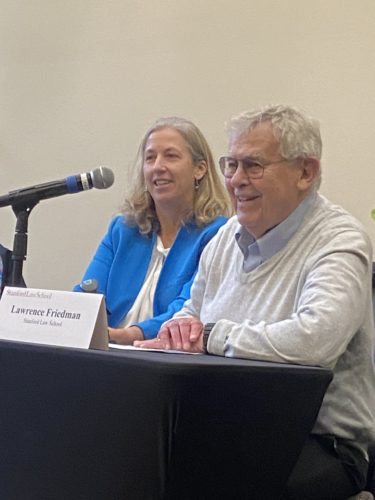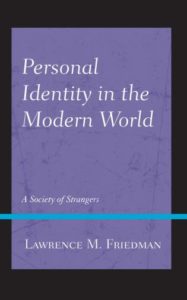‘Beloved’ and ‘Prolific’ SLS Scholar Honored for His Two Most Recent Books
The cold rain coming down outside Paul Brest Hall on January 13 only amplified the warm feelings inside as close to 70 colleagues and friends of Stanford Law School Professor Emeritus Lawrence Friedman gathered (with more on Zoom) to discuss his two most recent books.
Over the course of the half-day Celebration of Lawrence Friedman, nine panelists showered tributes on the still-prolific, 92-year-old legal historian. Amalia Kessler, director of the Stanford Center for Law and History and an organizer of the event, spoke of “our beloved” Friedman’s “great intellect” and “tremendous menschlichkeit,” a Yiddish word connoting kindness and integrity.

Two panel discussions illuminated Friedman’s most recent books, The Walled Garden: Law and Privacy in Modern Society (co-authored with visiting SLS professor Joanna L. Grossman) and Personal Identity in the Modern World: A Society of Strangers, both published in 2022. The law professor-panelists, most of whom were SLS alumni, provided their takes on the latest additions to Friedman’s ever-growing body of work. Several of the panelists were graduates of the Stanford Program in International Legal Studies (SPILS), which Friedman co-founded in 1995.
Friedman is one of the leading figures in the law and society movement, which focuses on the place of law in social, political, economic, and cultural life. His latest books showcase his trademark approach to legal scholarship: weaving law, history, and keen observations of past and present societies into highly readable analyses of why individuals, societies, and legal systems behave as they do.
Friedman has written or edited 47 books, including the pioneering History of American Law (1973, now in its 4th edition), the Pulitzer Prize-nominated Crime and Punishment in American History (1993) and a series of mystery novels featuring a Bay Area lawyer, Frank May. A fixture at Stanford Law School since 1968, he is one of the most frequently cited legal historians in the world. But that’s not due to dense law review articles or ivory tower sensibilities.
“The things that made Lawrence such a good teacher are the same things that make him such a good writer,” said UCLA School of Law professor Stuart Banner, JD ’88, who was in several of Friedman’s classes while at SLS. “Sometimes I read articles or books, especially by law professors, and I think, ‘what function does this serve?’ Often the answer is that the book or article seems to be intended to show that the author is very, very smart. Lawrence’s books aren’t like that at all. He writes in a friendly, knowledgeable, often bemused voice. He simply wants to share some of what he’s learned for our benefit, not his own. He is someone who certainly could be showing off cleverness if he wants, but he just has no interest in doing that.”
The Walled Garden: Law and Privacy in Modern Society
SLS visiting professor Joanna Grossman, JD ’94, co-author of The Walled Garden, joined the first panel of the day to discuss the book, her second with Friedman. The Walled Garden charts the historical development of the concept of privacy, primarily in the United States, a relatively recent construct, and one that is increasingly important.
Friedman and Grossman write about the concept of privacy in contexts ranging from public nudity to so-called revenge porn. Looking at both rights and duties, they provide an overview of historical and contemporary interpretations of privacy. Previously, Grossman and Friedman collaborated on Inside the Castle: Law and the Family in 20th Century America (1994).
Grossman, a professor at SMU Dedman School of Law, explained that “we have very different views of privacy today than we might have 200 or 300 years ago, but what stays constant is that people do have a certain consciousness of a right to privacy, and a certain sphere of privacy, which is often very obvious to them, but is not always obvious to the law. Our modern era is a complicated society in which people both simultaneously have very strong ideas about their ability to control their privacy, their identity, and their lives, but also like to vomit up their entire lives on the computer.”

Panelist Manuel Gomez, JSM ’02/JSD ’07, a professor at Florida International University College of Law, underscored The Walled Garden’s goal to illuminate not the academic or technical aspects of privacy rights, but “rights as understood by regular people … What I liked about the book was the contextualization, the authors’ ability to jump back and forth between the black letter law and the law in action, the norms, the social aspects, and morals,” he said.
Friedman’s own commentary on his book evidenced his penchant for self-deprecating humor, even as he explained how The Walled Garden breaks new ground. Most analyses of celebrity culture, and the attendant privacy issues, miss the point, he said.
“The point of celebrity is not being famous. Queen Victoria was famous, but she wasn’t a celebrity because she wasn’t familiar. A celebrity is someone who is famous and familiar, and that’s a product of television above all,” Friedman continued. “We think we know these people because we see them every day. I mean, the Pope is a celebrity. The Pope used to be locked up in the Vatican! This breeds the notion that you have a right to know everything about the Dalai Lama, or the Queen, or Harry and Meghan, and so on. The discussion of privacy and celebrity society is crucial to understanding what our world is like. Joanna and I think we are talking about something important, which, dare I say, hasn’t been fully recognized by the existing literature … but still won’t be because not all that many people are going to read our book,” he concluded to roars of laughter.
Watch the “Walled Garden” panel
Personal Identity in the Modern World: A Society of Strangers
In his second book of 2022, Friedman tackles sweeping questions of personal identity and criminal behavior during and after the industrial revolution. The book’s genesis can be traced to two of Friedman’s distinguishing traits: a fascination with sometimes-obscure primary sources—in this case, 19th-century newspapers, where he encountered numerous articles about bigamy—and a never-ending impulse to ask himself questions like, “Why is this happening? How do you become a bigamist?’” (I’m not recommending it by the way,” Friedman said to more laughter.)

In Personal Identity in the Modern World, Friedman comes to the conclusion that the geographic and social mobility of the 19th century, when many people left small, traditional villages for anonymous, teeming cities, allowed the creation of new identities and veneers. Crimes like bigamy, con games, and other types of fraudulent role-playing started to take root and flourish. Robert Louis Stevenson’s Strange Case of Dr Jekyll and Mr Hyde was one of the era’s many literary expressions of this new duality. It is no coincidence, Friedman writes, that detective stories and mysteries emerged as a wildly popular genre during this time in history.
University of Colorado Law School professor Carolyn Ramsey, JD ’98 (MA ’91), analyzed Personal Identity in the Modern Word through the lens of gender. “The potential to craft new identities raised the disconcerting prospect that men were not who they seemed and that beneath the veneer presented to the outside world, deviance and criminality might lurk. Interestingly, it seemed society was less willing to admit that women might have evil twins.”
Samantha Barbas, JD ’10, a professor at University of Buffalo School of Law, tied together themes from both The Walled Garden and Personal Identity in the Modern World to assert that the growth of privacy law in the late 19th and 20th centuries was a result of the increased ability of people to create their own identities in post-industrial, anonymous cities. “In a world of strangers, your identity and your fate depend on the impressions that you make,” she said. This has fed into a certain interpretation of the American dream, she continued, “that we can transform our lives and fates though changing our images. This is the personal makeover story, the celebrity story, the story that is repeated consistently in advertising, popular culture, and self-help books. With the right clothing, words, gestures, we can make good impressions and transcend our social status.”
In a pre-event interview, Friedman said he is working on a new book, a series of historical essays about how changes in technology have influenced culture, and how those cultural changes have, in turn, influenced the law. He hopes it will be published this year.
“I want to go on as long as I can,” he said with a smile.
